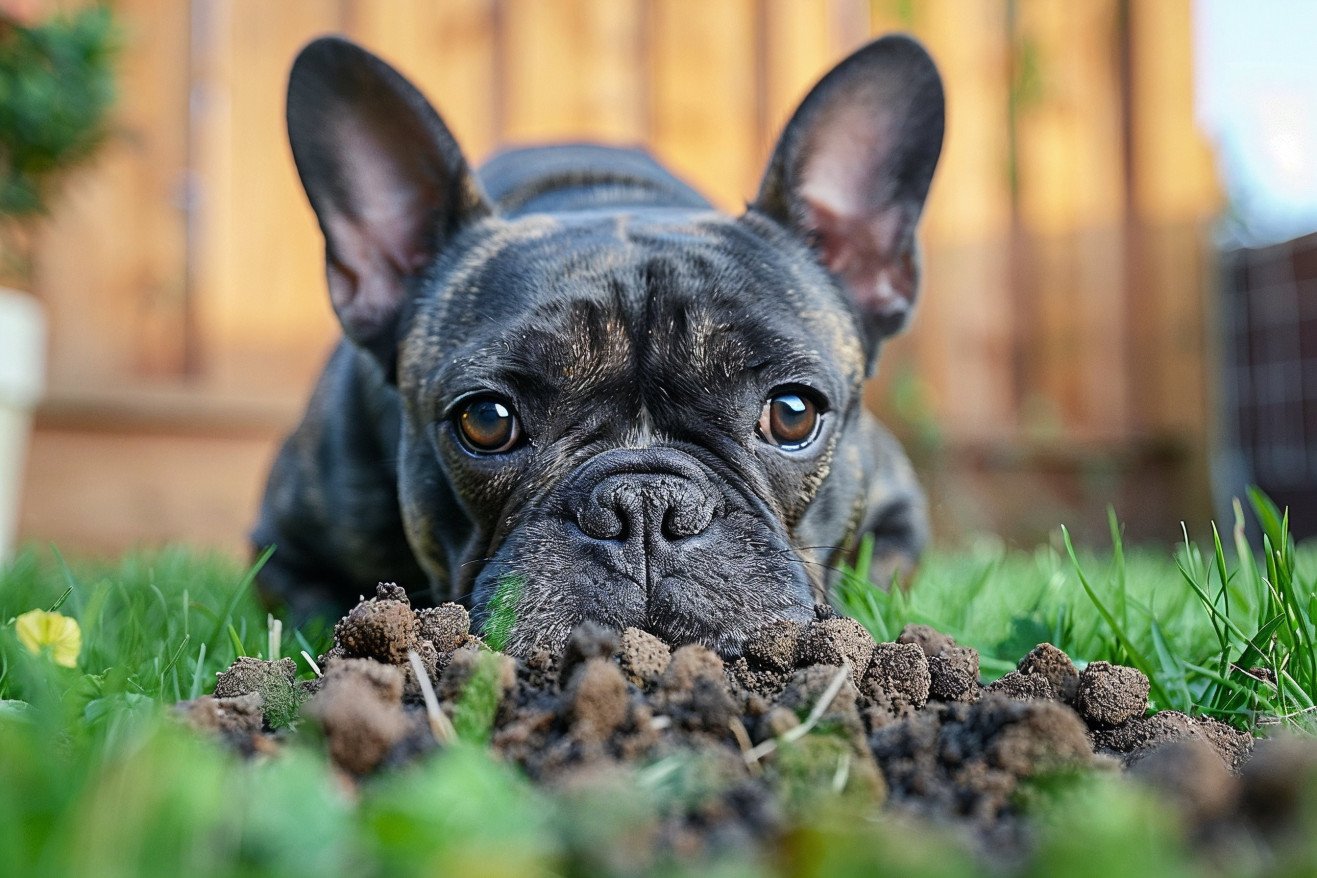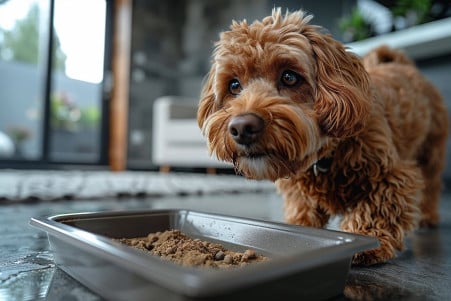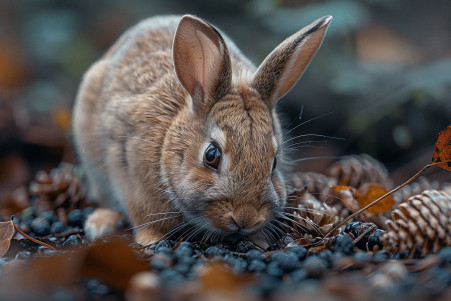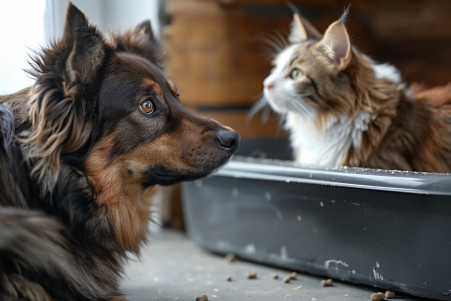Why Dogs Eat Rabbit Poop: Health Risks and Prevention Tips
25 February 2024 • Updated 24 February 2024

If you’ve ever caught your dog eating rabbit poop, you probably found the situation a little confusing and maybe even a little worrisome. Dogs eat rabbit poop because they find it tasty and appealing, a behavior known as coprophagia.
While this is mostly harmless, it can lead to health issues if the feces are carrying parasites. That said, it’s important to make sure you discourage your dog from eating rabbit poop and keep an eye on them for any signs of an upset stomach.
To help you better understand why your dog is engaging in this strange behavior, we’ll take a deep dive into veterinary science, animal nutrition research, and behavioral science.
We’ll discuss the health risks, nutritional considerations, and psychological motivations that may drive your dog to eat rabbit poop. We’ll also offer tips on how to handle this behavior and even stop it, so you can make sure your dog stays healthy and you can feel at ease.
Why do dogs eat rabbit poop?
Why Do Dogs Eat Rabbit Poop? A Look at Coprophagia in Dogs
The smell and taste of rabbit poop can be interesting to dogs, which is in line with their scavenging instincts. K9 of Mine explains that a dog’s interest in rabbit poop can be attributed to their natural scavenging instincts, as well as their curiosity and sense of smell.
In addition to instinct, the behavior can be learned. The American Kennel Club explains that puppies learn a lot of their behavior from their mothers, including eating feces to keep their den clean in the first few weeks after birth, which can set the stage for coprophagic behavior later in life.
Dogs may also eat rabbit poop because they have a nutritional deficiency or are simply hungry. Dogs with certain nutritional deficiencies may be drawn to rabbit poop, which is high in fiber and contains nutrients like B vitamins.
However, not all dogs eat rabbit poop, and the behavior is more common in dogs with certain dietary preferences or those that live in multi-dog households, where they may be more likely to learn or compete for such behavior.
Knowing why a dog is interested in rabbit poop can help you understand if there are any underlying nutritional reasons and can help you know what to look for in rabbit poop that might meet a dog’s nutritional needs.
Nutritional Composition of Rabbit Poop: What’s in It?
In addition to being a waste product, rabbit poop is a complex substance and a nutrient source. A study in PMC by Laura Gasco found that rabbit feces, which are high in fiber, have a biomethane potential similar to some traditional crops, suggesting an energetic value that may be appealing to dogs.
This suggests that the nutritional content of rabbit poop could be meeting dogs’ nutritional needs, including fiber, which is an important part of a dog’s diet.
Rabbits produce two types of poop: feces and cecotropes, with the latter being re-ingested because it is so nutritious. According to Live Science, cecotropes are packed with vitamins and minerals and are nutrient-dense because of the fermentation of food in the rabbit’s large intestine. Dogs may be attracted to rabbit feces because of their instinctual drives and nutritional needs, but they may also be attracted to the cecotropes.
To understand why dogs are attracted to rabbit poop, it’s important to understand the nutritional benefits and differences between rabbit feces and cecotropes.
While rabbit poop does contain some fiber, it’s important for dog owners to make sure their pets are getting a well-balanced diet that meets their nutritional needs, which can help prevent the desire to look for other food sources. This understanding of the nutritional value of rabbit poop can help determine how it might impact a dog’s health if they eat it.
Health Risks of Dogs Eating Rabbit Poop
While coprophagia is generally not dangerous, there are some health risks associated with dogs eating rabbit poop. Dogs can get sick from parasites like Coccidia and Giardia if they eat rabbit poop that contains them.
Dogs can also get leptospirosis, a bacterial infection that can cause kidney and liver damage, if they eat rabbit poop that contains Leptospira bacteria. If your dog has diarrhea, abdominal pain, and dehydration, these are all signs that they may have gotten sick from eating rabbit poop, and you should take them to the vet, especially if the symptoms don’t go away.
The risk of rabbit poop being harmful to dogs is often dependent on the rabbit’s health and the dog’s immune system. A healthy dog that eats a few rabbit pellets may not have any issues, while younger dogs and dogs with weaker immune systems may be more likely to get sick.
Owners can help reduce the risk by discouraging their dogs from eating rabbit poop, feeding them a healthy diet, training them with commands like “leave it,” and keeping them away from areas where rabbit poop is likely to be found.
If these measures fail, owners should monitor their dogs for signs of illness and take them to the vet if they notice anything concerning. Knowing about these health risks can help people have more informed conversations about the psychological and behavioral reasons why dogs eat rabbit poop.
Inside the Canine Mind: Why Do Dogs Eat Rabbit Poop?
To fully understand why dogs eat rabbit poop, and why they engage in coprophagia more generally, it’s important to consider both psychological and evolutionary perspectives.
For example, the article “The paradox of canine conspecific coprophagy” in PMC suggests that coprophagia in dogs may be a result of ancient survival behaviors.
Coprophagia may have been inherited from wolves, who may have eaten the feces of other wolves to keep their dens free of parasites that are typically found in feces that are more than two days old. The article also notes that in multi-dog households, maternal behavior and observational learning can perpetuate these behaviors, indicating that coprophagia may be a learned behavior rather than a sign of stress or illness.
Meanwhile, a study by Duke University’s Brian Hare and Vanessa Woods suggests that eating feces could have played a critical role in the evolution of dogs and may have even been an evolutionary advantage for the ancestors of modern dogs.
This could be due to an inherent tendency in dogs to keep their living spaces clean and free of parasites, a hypothesis that is supported by the evolutionary relationship between dogs and humans and other animals.
Understanding these behavioral factors is important for developing effective ways to prevent and treat coprophagia. By recognizing the complex relationship between instinct, learning, and health, we can take a more informed and compassionate approach to addressing coprophagia—one that results in dietary and environmental changes that are more in line with a dog’s natural tendencies and needs.
The Role of Canine Digestion and the Microbiome
The canine digestive system is well-equipped to handle a diverse diet, including the occasional consumption of rabbit feces. The gut microbiota is essential for digestion, and a study in Microbiome found that the gene content and response to diet of the canine gut microbiome is similar to that of humans. This suggests that the canine digestive system has evolved to process foods that are similar to those that humans eat.
In a paper in PMC, Jan S. Suchodolski explains that the gut microbiome acts as a metabolic organ that impacts the health of dogs and may have the potential to provide benefits from the many microbial metabolites found in rabbit feces. The way that dogs are built allows them to eat non-traditional foods and potentially get microbial benefits that help them meet their nutritional requirements.
Knowing how the microbiome impacts a dog’s dietary choices can help when it comes to making recommendations for dogs that are prone to coprophagia. A study of 96 healthy dogs, which was published in PMC, showed that manipulating the gut microbiota through diet can help improve the lives of our furry friends, and it can help inform responsible dietary choices and interventions.
Conclusion: Why Do Dogs Eat Rabbit Poop?
In the search to understand why dogs eat rabbit poop, we have found several reasons why this behavior happens. The smell and taste of rabbit poop are attractive to dogs and can stimulate their scavenging instincts and curiosity. The fiber and other nutrients found in rabbit poop may also be nutritionally attractive, especially if a dog’s diet is lacking in these nutrients.
That said, there are also dangers associated with eating rabbit poop. Dogs can be exposed to parasites such as Coccidia and Giardia from rabbit poop, which is why prevention and monitoring are so important. Knowing the psychological and behavioral reasons for these innate behaviors and learning by example can help control this predisposition.
In addition, understanding the role of the dog’s gut and microbiome in digestion can help explain how dogs process food from these unusual sources.
The bottom line for dog owners is the importance of knowing their dog’s behavior and nutritional requirements. By being a responsible pet owner and taking a proactive approach to health care, coprophagia can be avoided and the health and happiness of our dogs can be protected. This knowledge can help pet owners raise pets that are healthy, happy, and well-adjusted.


